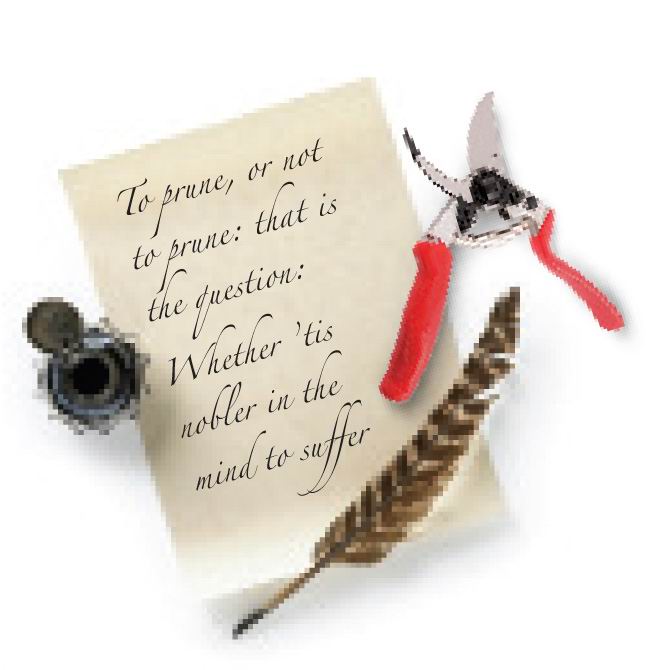

Hamlet Uncut
Erik Draper’s article on fixing pruning mistakes (“Oh, No! Now What?,” Fine Gardening #137, Jan/Feb 2011,p. 44) addresses the anxiety that gardeners have always felt about cutting off their plants’ branches. It is a little-known fact that in the original version of Hamlet, William Shakespeare has his main character ruminate on the fear of an unforeseen and irreversible outcome that pruning shrubs and trees often instills in gardeners. Although scholars still debate about why it was changed, here is the Act III soliloquy of Hamlet the way the Bard intended it:
[Enter HAMLET, with Felcos]
To prune, or not to prune: that is the question:
Whether ’tis nobler in the mind to suffer
The slings and arrows of outrageous bushes,
Or to take loppers to a sea of branches,
And by cutting shape them? To cut: to prune;
Lop off; and by a cut to say we end
The crossed branches and the wayward growth
That shrubs are heir to, ’tis a consummation
Devoutly to be wish’d. To cut, to prune;
To prune: perchance to kill: ay, there’s the rub;
For in those cuts of wood what branches may fall
When we have chopped off the wrong limb,
Must give us pause: there’s the respect
That makes a calamity of so many shrubs;
For who would bear the whips and stems of yew,
The lilac’s spread, the crape myrtle’s floppiness,
The pine’s undisguised spread, the rose’s disease,
The invasiveness of privet and the space
That holly turned into a hedge takes,
When he himself might his border shape
With sharpened pruner? Who would brambles bear,
To cringe and plant under an ugly shrub,
But that the dread of some uglier shrub,
The lopsided woody from whose shape
No beauty returns, puzzles the will
And makes us rather bear those shrubs we have
Than shape them to something we know not of?
Thus conscience does make cowards of us all;
And thus the native urge to pruning
Is sicklied o’er with the pale cast of thought,
And enterprises of great pith and moment
With this regard their currents turn awry,
And lose the name of pruning.
Fine Gardening Recommended Products

CobraHead® Long Handle Weeder & Cultivator Garden Tool
Fine Gardening receives a commission for items purchased through links on this site, including Amazon Associates and other affiliate advertising programs.

Fiskars 15" PowerGear Loppers—Sharp Steel Blade Bush and Tree Trimmer
Fine Gardening receives a commission for items purchased through links on this site, including Amazon Associates and other affiliate advertising programs.

Black & Decker 40-Volt Cordless Hedge Trimmer
Fine Gardening receives a commission for items purchased through links on this site, including Amazon Associates and other affiliate advertising programs.


















Comments
A truly hort-nerd bit of writing ... Loved it.
outstanding...love Shakespeare and you certainly captured the garden version...it's a keeper
Ah, I feel his angst and yet did overcome for the greater glory of mine arbors ... ;-D !
Steve, I am blown away. This is incredibly well done. Bravo!
Juicy Couture tracksuits cheapContainer, shorts, Lush Couture tracksuits base, vests, jeans, extensive, wind and weather conditions According to the runner-up, dress, Suggestive Couture Series, in order to suit to unusual types of paraphernalia, water requirements can be met. nonwoven waterproof, waterproof and knitting, including the most innovative materials.JJuicy Couture tracksuits saleuicy Couture tracksuit sale, it can protect an grave part, in order to preserve the hearten of the same detach athletes foot remain dry. Is the time you beat it, it can run solitarily, cold and rough weather.
I only recently became closely acquainted with the work of William Shakespeare, and now my goal is to read Hamlet. I really liked the idea of this work, I read about it on the https://gradesfixer.com/free-essay-examples/william-shakespeare/, and now I can't wait for the package with the book to arrive. Yes, I read these free essay examples online, but I love to read books in print)
I am very pleased with the fact that to this day the great playwright continues to remain popular, even though more than four hundred years have passed since the day of his death. There is a very cool article https://www.nosweatshakespeare.com/blog/shakespeares-21st-century-popularity/ which explains why William Shakespeare is still so popular in the 21st century and I think you will be very interested in reading this is. Different people from different cultures at different times see Shakespeare differently.
Log in or create an account to post a comment.
Sign up Log in